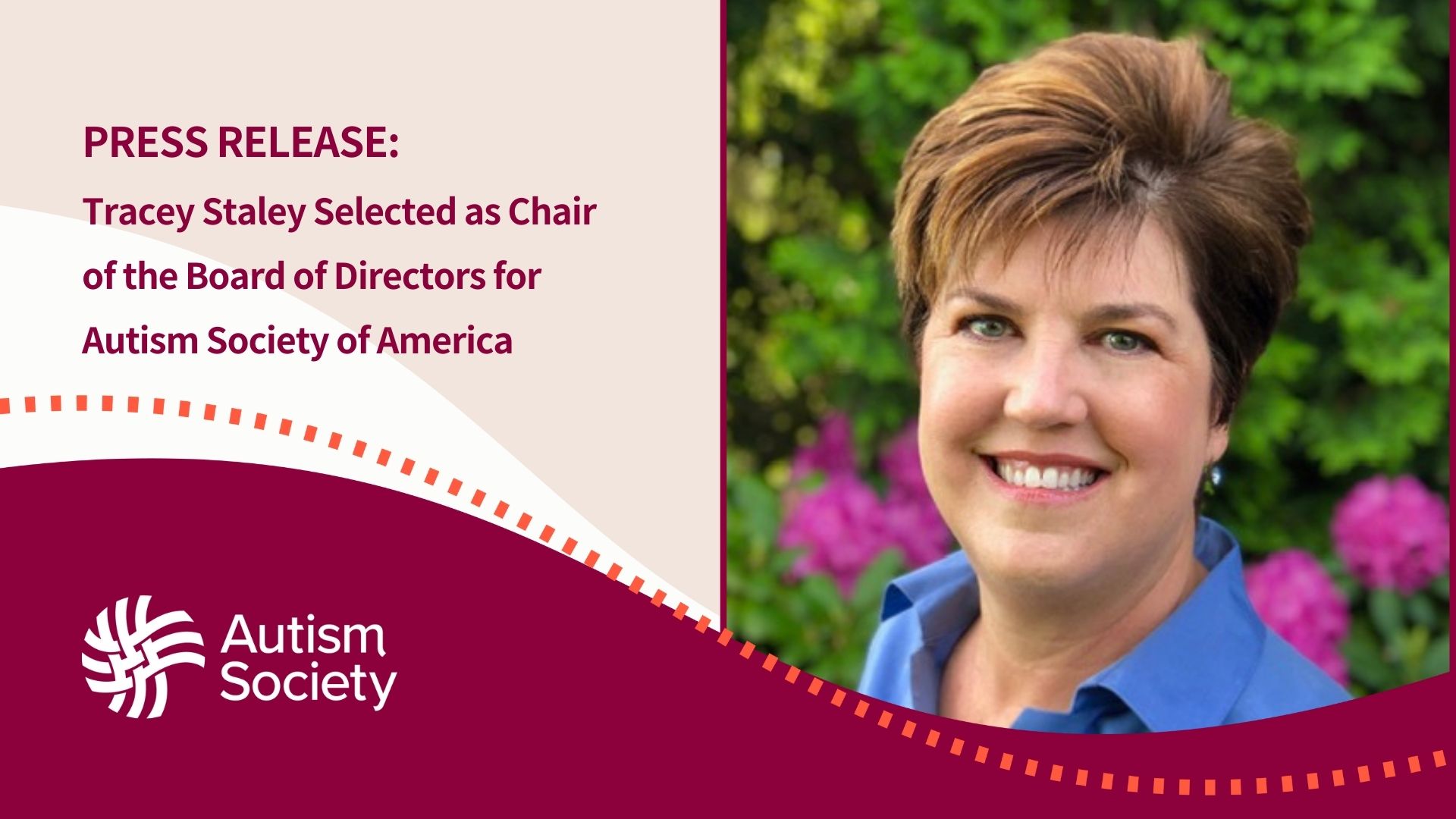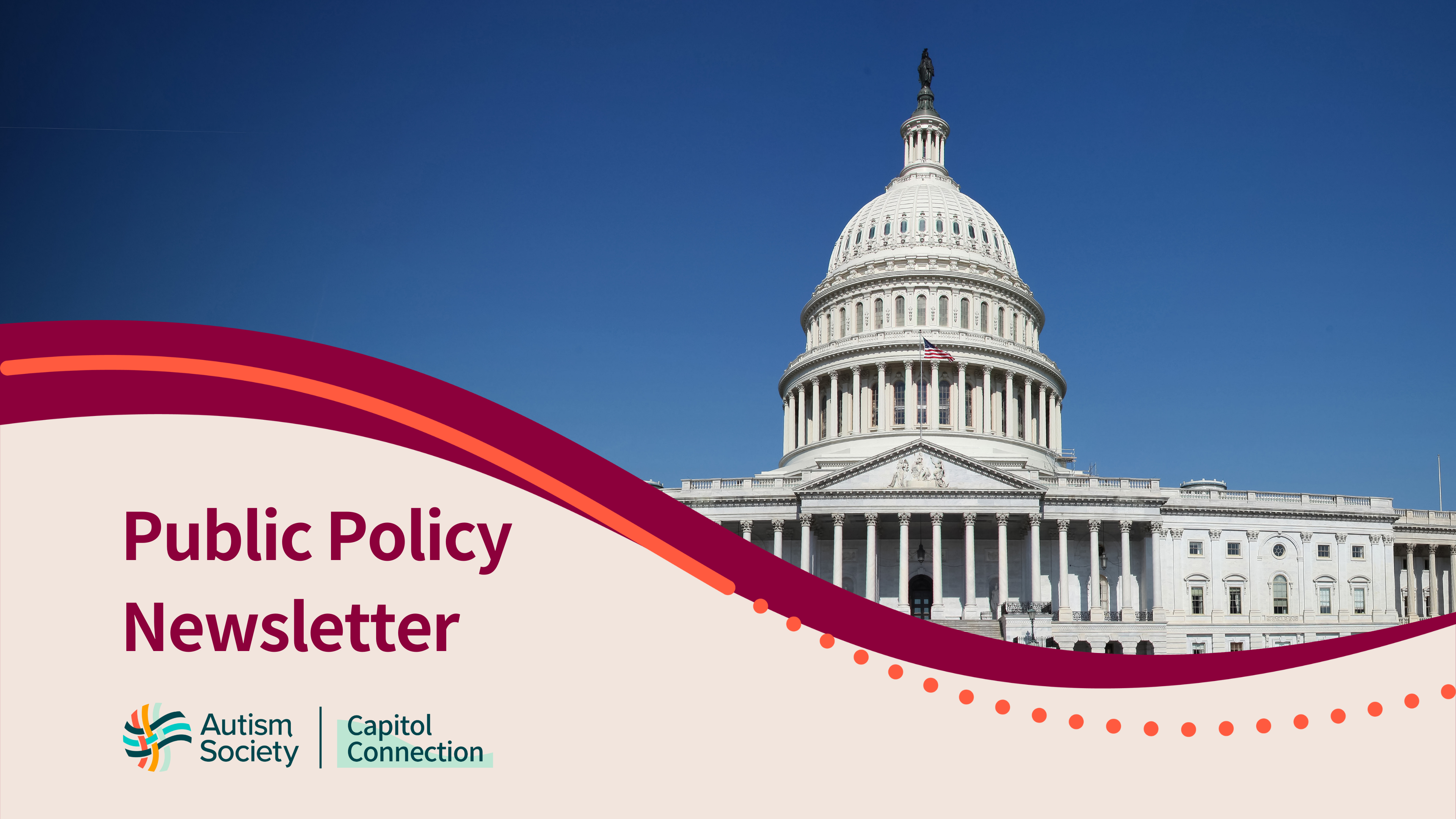
Take action! This Autism Acceptance Month, we urge all supporters to Make Your Voice Heard, Spread the Word, and Show Your Support! Congress must reauthorize the Autism CARES Act and send it to President Biden before it expires on Sept. 30. Learn how you can help!
Disability Policy Seminar Recap
Over 750 advocates came to Washington, D.C. for the Disability Policy Seminar. Several panels featured affiliates such as a panel on education and employment moderated by Rachel Deaton from the Autism Society of Indiana, and a panel on criminal legal issues where Tiffany Klauba from the Autism Society of Idaho discussed advocacy in her state with the help of the Autism Justice Center. Advocates took what they learned from sessions to the Hill to educate their members of Congress. A breakfast rally was held before Hill meetings with the following Members of Congress: Representatives Larson (D-CT), Waters (D-CA), Moulton (D-MA), Danny Davis (D-IL), and Molinaro (R-NY), as well as Senators Markey (D-MA), Wyden (D-OR), and Van Hollen (D-MD) for attending and supporting the disability community. Affiliates from these states are encouraged to thank them.
For those unable to participate in person, please use the fact sheets as talking points as you reach out to meet with your Members of Congress when they are back in their district/state. Please contact Kim Musheno or Delancy Allred for help making appointments in person or virtually.
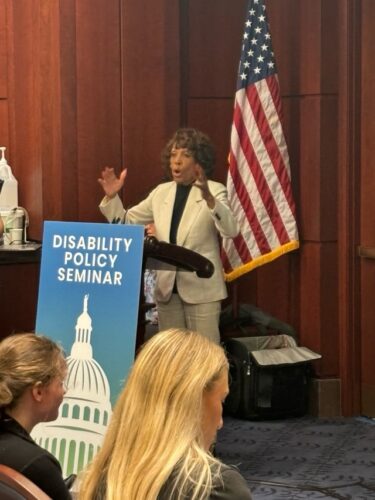
Rep. Maxine Waters (D-CA) speaks to DPS participants
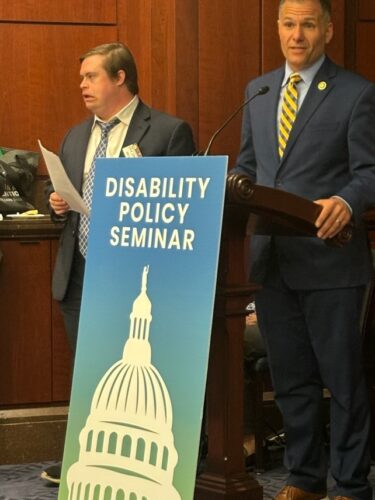
Rep. Marc Molinaro (R-NY) speaks to DPS participants
Presidential Proclamation for World Autism Awareness Day
In a statement, President Biden declared April 2nd, 2024, as World Autism Acceptance Day. This is the first time this Day has been referred to as Autism Acceptance, a shift from Autism Awareness Day. Biden’s proclamation is representative of a move to learn more about Autism to improve early diagnosis, to learn more about the experiences of Autistic people from Autistic people, and to build more welcoming and inclusive communities to support people with Autism. The administration also reaffirmed its commitment to improving access to healthcare, promoting inclusive education, and enhancing job opportunities for those with Autism.
Legislative Updates
New Comprehensive Direct Workforce Bill
On April 15th, Sens. Casey, Kaine, and Baldwin introduced the Long-term Care Workforce Act with 22 additional co-sponsors. The bill was endorsed by 44 organizations, including the Autism Society of America, Long Term Care Community Coalition (LTCCC), PHI, Caring Across Generations, SEIU, AFSCME, the National Domestic Workers Alliance (NDWA), PHI, and the National Alliance of Direct Support Professionals (NADSP). Specifically, the Long-Term Care Workforce Support Act will: Increase the number of direct care professionals, including in rural communities; Provide pathways to enter and be supported in the workforce for women, people of color, and people with disabilities; Improve compensation for direct care professionals to reduce vacancies and turnover; Ensure that direct care professionals are treated with respect, provided with a safe working environment, protected from exploitation, and provided fair compensation; Improve access and quality of long-term care for families; Document the need for long-term care, identify effective recruitment and training strategies; Promote practices that help retain direct care professionals; and Strengthen the direct care professional workforce in order to support the 53,000,000 unpaid family caregivers who are providing complex services in the home and across long-term care settings. A hearing on the topic was held on April 16 in the Senate Aging Committee.
NICHD Appropriations Letter
The Autism Society signed a letter prepared by the Friends of NICHD requesting additional funding for the Eunice Kennedy Shriver National Institute of Child Health and Human Development (NICHD) for Fiscal Year 2025. NICHD funds the Intellectual and Developmental Disabilities Research Centers (IDDRCs) which focus on IDD research, which has historically been flat funded. Established in 1963, the IDDRC network represents the nation’s first and foremost sustained effort to prevent and treat disabilities through biomedical and behavioral research.
Family-to-Family Reauthorization
The Autism Society signed onto a letter led by Family Voices urging Congress to pass H.R. 7300, the “Family-to-Family Reauthorization Act of 2024,” and provide an increase in funding for the Family-to-Family Health Information Centers (F2F HICs) program. F2F HICs are family-led nonprofits in every state that aid families in understanding treatment options; coordinating appointments, services, and medications; facilitating access to peer-to-peer counseling and emotional support; navigating insurance; and promoting leadership training and development, all with the overarching goal of enhancing the well-being of the child and the entire family unit. The program has received $6 million annually in federal funding. This represents $96,000 per state. Family Voices is advocating for additional funding in the reauthorization and through the annual appropriations process.
Administrative Updates
CMS Final Rule to Streamline Health Care Coverage Enrollment
The Biden-Harris Administration introduced a final rule aimed at enhancing the process for millions to apply for, renew, and sustain healthcare coverage through Medicaid, CHIP, and BHP The Rule will streamline enrollment procedures and remove barriers. This rule also updates ACA coverage protections. HHS Secretary Xavier Becerra emphasized the importance of reducing administrative hurdles to ensure American families’ security and peace of mind. CMS Administrator Chiquita Brooks-LaSure highlighted the goal of simplifying enrollment processes to protect vital coverage for eligible individuals. This rule includes provisions such as eliminating annual and lifetime limits on children’s coverage in CHIP and prohibiting states from conducting renewals more frequently than every 12 months. The rule strengthens federal regulations for Medicaid and CHIP enrollment nationwide, emphasizing health equity. Additionally, HHS released a report estimating that 17 million children and youth will benefit from continuous eligibility provisions. Further updates to federal regulations by CMS are expected later. These will focus on improving managed care and access to critical services provided by Medicaid and CHIP.
DOJ Final Rule for Online Accessibility
The Assistant Attorney General Kristen Clarke announced a final rule signed by Attorney General Merrick Garland under the Americans with Disabilities Act (ADA), aiming to ensure the accessibility of web content and mobile apps for people with disabilities. Every day, people across the country use the internet and mobile apps to access public programs and services, including emergency information, courts, healthcare providers, schools, voting information, parking, permit applications, tax payments, and transit updates. If these technologies are not accessible, it can be difficult or impossible for people with disabilities to access critical services. The rule clarifies obligations for state and local governments to make their online platforms accessible, aiming to provide equal access to public services. This move is crucial in eliminating discrimination against individuals with disabilities.
Webinar on How to Provide Comment on FDA Proposed Rule on Shock Devices
The Autistic Self Advocacy Network (ASAN) held a webinar on the Notice of Proposed Rulemaking from the Food and Drug Administration (FDA) to ban electric shock devices for use on individuals with disabilities. The webinar provides a history of the devices and the FDA’s attempts to ban them as well as plain language instructions on how to provide comments. The Autism Society will also be providing comments and a customizable template via our Action Center soon.
Education Assessments
The Every Student Succeeds Act (ESSA) imposes a 1.0 percent cap on using alternative assessments and alternative academic achievement standards for students with significant cognitive disabilities. This provision has been in effect for six years, but 33 states remain non-compliant, resulting in the inappropriate assignment of hundreds of thousands of students to alternative assessments. The primary issues include lack of consequences for non-compliance, inadequate monitoring of standards, and states consistently exceeding the cap. The Consortium for Constituents with Disabilities (CCD) published a fact sheet with an analysis of how states are implementing this policy and recommendations for improvement. CCD also met with officials within the Department of Education to discuss the analysis and recommendations. Recommendations include denial letters and consequences, integration of compliance into annual determinations, and corrective actions to hold states accountable. More information can be found in this CCD fact sheet.
White House Easter Egg Roll
The Autism Society was excited to be part of The White House Easter Egg Roll festivities. For the past two years, the White House has provided a sensory-friendly hour portion of the event to allow for shorter lines and a quieter experience.

Children participate at the White House Sensory Hour Egg Roll
State Updates
State Bills Passed
With many state sessions coming to an end, we wanted to highlight several disability-related bills that successfully became law. Maryland passed a bill to establish a Purple Alert that ensures individuals with IDD who wander are found and a bill that mandates materials on ABLE Accounts are shared during IEP and 504 meetings. Maryland also passed a bill that establishes a trust for families and caregivers to hire attorneys, advocates, and consultants during the special education process. The Autism Society of America and Autism Society of Maryland provided testimony in support of this bill. Virginia had a few disability-related bills signed into law as well, including one that ensures SSDI is disregarded as monthly income for eligibility in state HCBS waivers and another law that mandates police training on Autism. The curriculum must be developed by self-advocates and Autism organizations within the state.
Illinois Autism Advocacy Day
The Autism Society of Southern Illinois and coalition partners hosted an Autism Advocacy Day at the State Capitol in Springfield, Illinois. The Autism Society of America policy team was happy to be at the event along with lead State Representatives and 100 advocates. In addition, the Governor’s office presented their proclamation, declaring April as Autism Acceptance Month, moving away from Awareness for the first time. The coalition is supporting legislation to increase wages for direct support workers, promote supported decision-making, and ban the payment of sub-minimum wages for individuals with disabilities.
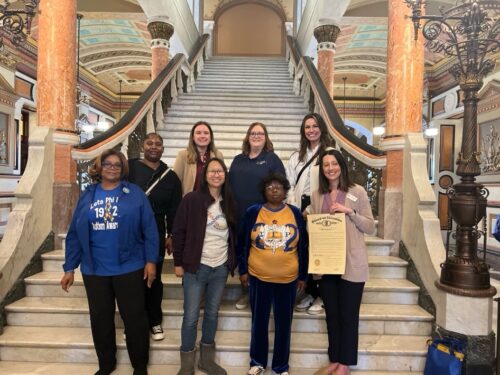
Advocates with the Governor’s Proclamation at the Illinois State Capitol for Autism Advocacy Day
Justice Corner
Public Defender Training
Justice Task Force member Nick Dubin, Psy.D., and Carlean Ponder, Director of the Autism Justice Center, presented a two-hour training to the Office of the Kansas Federal Public Defender on April 11. Steve Kelsey, Executive Director of the Autism Society Heartland affiliate was also on hand to answer questions. Attendees asked questions about working with family members of Autistic clients, which types of psychological experts to engage, and how to distinguish Autism from other types of disabilities.
Solitary Confinement
Senator Dick Durbin (D-IL), chair of the Senate Judiciary Committee, held a hearing on the over-use of solitary confinement in federal prisons. Sen. Durbin held the first Senate hearing on this topic in 2012. He lamented that few changes have been made to reform the system since that time. The hearing included first-hand testimony from people with disabilities who were subjected to solitary confinement for consecutive months and even years. The recording of the hearing is available on the committee’s website.
Share:

